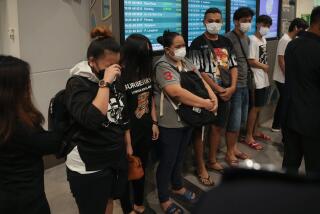Coast Guard searches for missing oil rig workers
Eleven offshore oil workers remained missing Wednesday night off the southeastern tip of Louisiana, a day after an oil rig fire sent a column of flame into the sky and pangs of worry through a community built around the risky job of extracting valuable crude from below the ocean floor.
The U.S. Coast Guard had helicopters, boats and a plane searching a 900-nautical-square-mile section of the Gulf of Mexico near the mobile offshore drilling unit Deepwater Horizon, which burst into flames after an explosion around 10 p.m. Tuesday.
Waterborne firefighters were still battling the blaze Wednesday night as Coast Guard experts worked to assess any environmental cleanup that may be necessary, said Mike O’Berry, a senior chief petty officer. The $600-million rig also was listing significantly.
But the main focus was on the missing workers.
“The best possible outcome is that we find every single one of these people alive and healthy, and that we get them back to their families,” said Guy Cantwell, a spokesman for Transocean Ltd., the Swiss company that owns the rig. “That’s what we’re hoping and praying for.”
At the time of the fire, 126 people were aboard the Deepwater Horizon. Most escaped unharmed.
The Coast Guard expected 94 people to arrive by boat in this industrial port town early Thursday morning. Four others were transferred to another vessel.
Seventeen people were evacuated by helicopter. Some were treated at hospitals in the New Orleans area and Mobile, Ala. Three of the 17 were in critical condition, O’Berry said.
Port Fourchon was a tense and somber place Wednesday night. The sprawling, 1,300-acre port — set along the Gulf Coast, at the edge of Louisiana’s watery southeastern maze of bayous and oil towns — bills itself as “The Gulf’s Energy Connection.” It exists almost exclusively to support deep-water oil and gas exploration and drilling.
Several oil industry workers were nursing beers and waiting for word on the missing at the Kajun Truck Plaza, a 24-hour hangout amid the utilitarian industrial landscape of pipe companies, pallet boxes, storage tanks and, in the near distance, boats and barges heading to and from the rigs.
Bill Crane, 49, of Monterey, La., said three of his friends had been aboard the Deepwater Horizon when the fire started. He heard that one friend was sleeping when an explosion blew him into the next room, breaking his leg. Another friend, he said, a man in his 20s, was among the missing.
“I hope they find him,” Crane said. “He’s a good boy. A good friend.”
“He’ll be all right,” bartender Julie Badger said. “God watches over people like that.”
The incessant threat of accident or personal injury is a grudgingly accepted fact of life here. The Associated Press, citing the federal Minerals Management Service, reports that there have been 69 offshore deaths, 1,349 injuries and 858 fires and explosions in the Gulf since 2001.
Still, offshore work is highly prized: Workers are relatively well-paid, and their schedules, which often involve one to three weeks offshore, then a few weeks off, are favored by many who dislike the 9-to-5 grind. The rig workers, known as “roughnecks,” also enjoy a certain mystique as the rough-hewn, can-do enablers of one of Louisiana’s most important industries.
“I see them how they come in when they’re off, and they look like they need a drink,” Badger said, smiling. “I know how to cut ‘em off when they’re drunk.”
On its website, Transocean Ltd. calls itself “the world’s largest offshore drilling contractor and the leading provider of drilling management services worldwide,” with 140 offshore oil rigs, and an emphasis on “technically demanding segments of the offshore drilling business.”
The Deepwater Horizon was contracted out to the oil company BP Exploration & Production Inc. Cantwell, the Transocean spokesman, said the rig can drill more than 30,000 feet deep. He couldn’t say whether it could once again be operational.
Raymond Smart, a deep-water dispatcher, was among those speculating about what went wrong. From his barstool, the only thing he could say for sure was that accidents would always happen in an industry like this one.
“I’ve seen it happen time and time again,” he said. “You’ve just got to pray for them. It’s all you can do.”
At the truck stop late Wednesday, Patricia Grant said she’d heard that her brother Kevin Eugene was safe and would be arriving later by boat. When he gets home, she said, “We’re going to hug him and kiss him and tell him we love him.”
More to Read
Start your day right
Sign up for Essential California for news, features and recommendations from the L.A. Times and beyond in your inbox six days a week.
You may occasionally receive promotional content from the Los Angeles Times.






